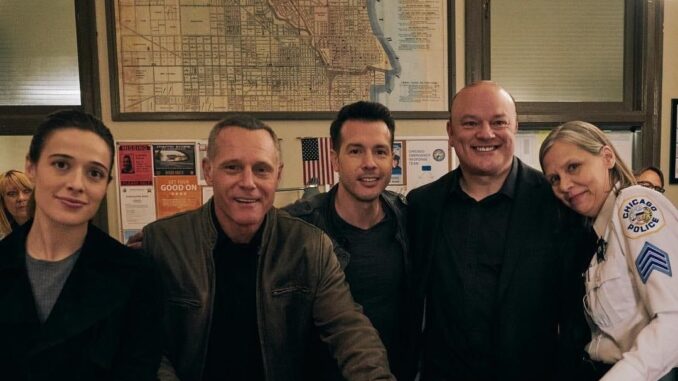
They rarely hug. They never say “I care.” But Voight and Trudy share something deeper: loyalty built in grief, silence, and shared trauma. This is the underrated relationship that holds Intelligence together — without ever needing the spotlight.
In a world where gunfire echoes louder than emotion and loyalty is tested at every turn, Chicago P.D. has carved out a reputation for raw, real storytelling. At the center of it all stands Sergeant Hank Voight — hardened, haunted, unrelenting — and Sergeant Trudy Platt — sharp-tongued, unshakeable, and fiercely protective. Most viewers recognize them individually. But few fully see what they are together: an anchor of quiet loyalty that has held the Intelligence Unit steady when everything else fell apart.
They don’t exchange long speeches or sentimental confessions. They rarely share screen time. And yet, every moment they’re together speaks volumes. Their bond isn’t romantic or flashy. It’s not meant to trend on social media. It’s the kind of connection that exists in real life — the kind built from shared pain, mutual respect, and the unspoken understanding that sometimes, silence is enough.
The Bullpen Isn’t Just an Office. It’s a Battlefield.
Most of their interactions happen in passing. A glance. A nod. A brief exchange of concern masked by sarcasm. To the casual viewer, these moments seem minor — even forgettable. But for those who watch closely, every subtle moment between Trudy and Voight is charged with unspoken emotion. The bullpen becomes more than just a place to process cases. It’s the front line of a war they’ve both been fighting for years — against crime, against grief, and sometimes against themselves.
Trudy never oversteps. She doesn’t try to “fix” Voight. But she’s always there, watching him with the eyes of someone who understands pain — not just recognizes it. And Voight? He listens to her. In a world where he trusts almost no one, he listens to Trudy. That says everything.
Grief Doesn’t Always Scream. Sometimes It Just Sits Beside You.
One of the most defining moments of their connection came after the death of Alvin Olinsky. Everyone in the unit was shattered. But it was Voight who carried the heaviest weight — guilt, anger, devastation. In the quiet aftermath, there was no grand speech. No pep talk. No scripted breakdown. There was Trudy. She simply placed a hand on Voight’s shoulder. No words. Just presence.
That single moment left fans speechless. It wasn’t just a gesture — it was everything Trudy needed to say, and everything Voight needed to hear. He didn’t flinch. He didn’t push her away. He just sat in that silence, letting her loyalty hold him up when he couldn’t stand on his own. In a show filled with explosive drama, that whisper of connection roared louder than any gunshot.
Different Pains, Shared Scars
Voight has lost a son. Trudy has buried friends. Both have faced unimaginable trauma in their own ways. Yet neither wears their pain on their sleeve. They compartmentalize. They survive. And they keep showing up — for their people, and for each other.
They’re two sides of the same coin: Voight, the enforcer; Trudy, the guardian. Where he burns hot, she keeps the fire contained. Where he lashes out, she balances with biting wit and calm control. It’s not about one saving the other — it’s about understanding without explanation. They don’t need to talk about the pain to know it’s there.
That’s what makes their relationship so powerful. Not in grand gestures, but in resilience. In the way they show up for each other again and again — silently, fiercely, without asking for anything in return.
Why This Relationship Matters — Even If It’s Quiet
TV shows often glorify romance or rivalry. But the bond between Voight and Trudy proves that quiet loyalty can be just as compelling. Their relationship doesn’t rely on drama. It’s not about confessions or closure. It’s about being there. Day in, day out. Especially when things fall apart.
Trudy isn’t part of Intelligence in the field, but she’s just as crucial behind the scenes. She’s the one who keeps things from unraveling. Who holds Voight accountable without ever raising her voice. Who supports the unit in ways they’ll never fully see — or maybe just take for granted.
Voight, in turn, never questions her. He doesn’t have to. His trust in Trudy is implicit. And for a man who’s built walls higher than most can climb, that trust speaks volumes.
The Beauty of Subtle Storytelling
In today’s era of over-explained TV, the Voight-Trudy relationship is a masterclass in subtle storytelling. It doesn’t beg for attention. It doesn’t need to. Their dynamic is a reminder that not every powerful relationship needs a dramatic arc. Some are built in the quiet moments — the ones you miss if you’re not paying attention.
And maybe that’s the point. Maybe Chicago P.D. is showing us that strength doesn’t always scream. That loyalty isn’t about grandstanding, but about standing your ground when it matters most. That the people who see us in our worst moments — and stay — are the ones worth everything.
